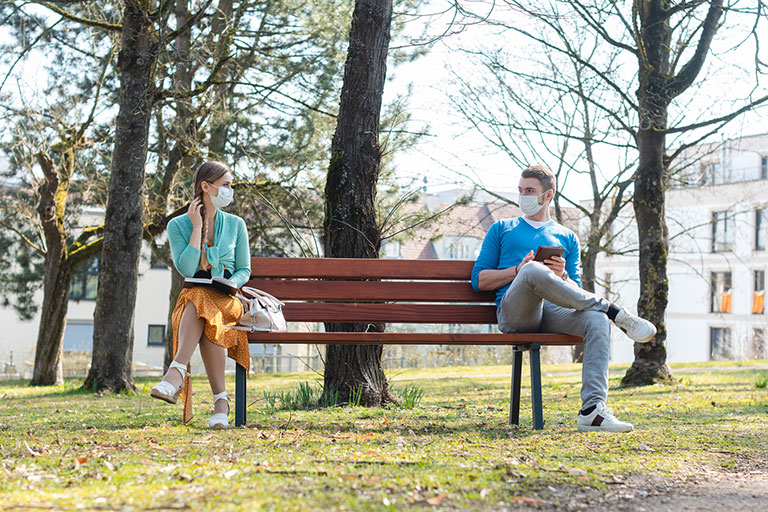Study examines effects of public health interventions on human behavior
Practicing social distancing and staying six feet from others is all part of the "new normal" in a COVID-19 world. But how do these public health interventions impact human behavior?
IUPUI’s Kelly Wierenga is working with colleagues, including Case Western Reserve University’s Scott Emory Moore, to increase knowledge about how health behaviors and health outcomes of Americans have changed as a result of recent restrictions.
"Whether they have the virus or not, people are being asked to do a lot of things like wear masks, increase hygiene, and change how they shop or act in their own homes – all as a result of an acute illness," said Wierenga, an assistant professor in the IU School of Nursing. "We want to look at what people are thinking and feeling about COVID-19, how it is impacting their behaviors, and how it impacts health outcomes."
She hopes to understand more about the self-management behaviors of people in the United States as they deal with COVID-19 and the resulting health outcomes, because that knowledge will help guide how to help people in the future adapt to complex and demanding health needs. Self-management behaviors are difficult to successfully adhere to whether in a pandemic or even just in dealing with other illnesses.
To do so, her team launched a nationwide survey in March asking adults to share their thoughts and feelings on a variety of topics, ranging from questions about health, including anxiety and depression, to physical distancing and other behaviors.
"There are likely some Americans who implemented social distancing behaviors really quickly, while others took a more tapered approach," Wierenga said. "We want to understand more about when these people made their choices and what other associated thoughts and feelings went along with it."
Nearly 1,300 people have completed the survey to date, and while responses are varied, data shows that they have all felt the effects of COVID-19, particularly in terms of anxiety and depressive symptoms.
"Other illnesses impact just the patient and their family and friends, but this pandemic is impacting everyone," Wierenga said. "With COVID-19, people who do not know someone with the virus are still struck by mandates as to whether or not to social distance."
Preliminary findings from this study have identified connections between aspects of how people characterize their views of the virus and increases in symptoms of depression and anxiety.
With support from the IU School of Nursing Center for Enhancing Quality of Life in Chronic Illness, her team is starting to survey this same group on a regular basis to see how their responses change over time.
"We are very interested in the long-term well-being of people so we can better understand how people respond to a pandemic or other acute illness," Wierenga said. "We want to know how people think about this pandemic, how their feelings and psychological distress are impacted and how thoughts and feelings can have short and long-term impacts on how they care for themselves and respond to illnesses in the future."
She hopes the research will be beneficial to people as we start to address re-entry anxiety and the potentially long-term effects of the pandemic on health and well-being.
"We are learning how people are responding to COVID-19 specifically, but it’s also about how people respond to illness in general," Wierenga said. "This likely will not be the last illness that occurs like this, that’s highly transmittable and different than many other illnesses we encounter, and the way people protect themselves during this time is something that can be translated."



